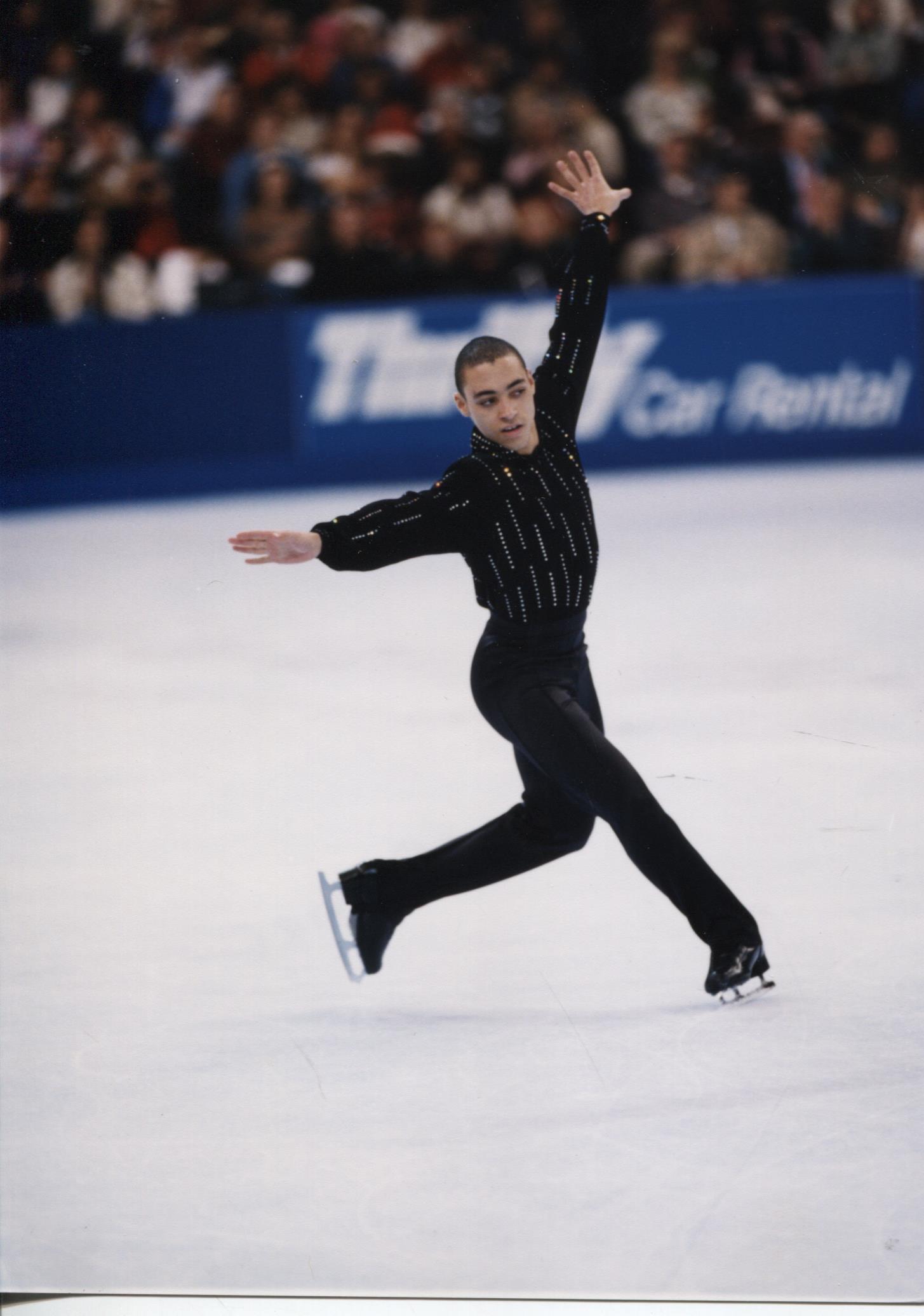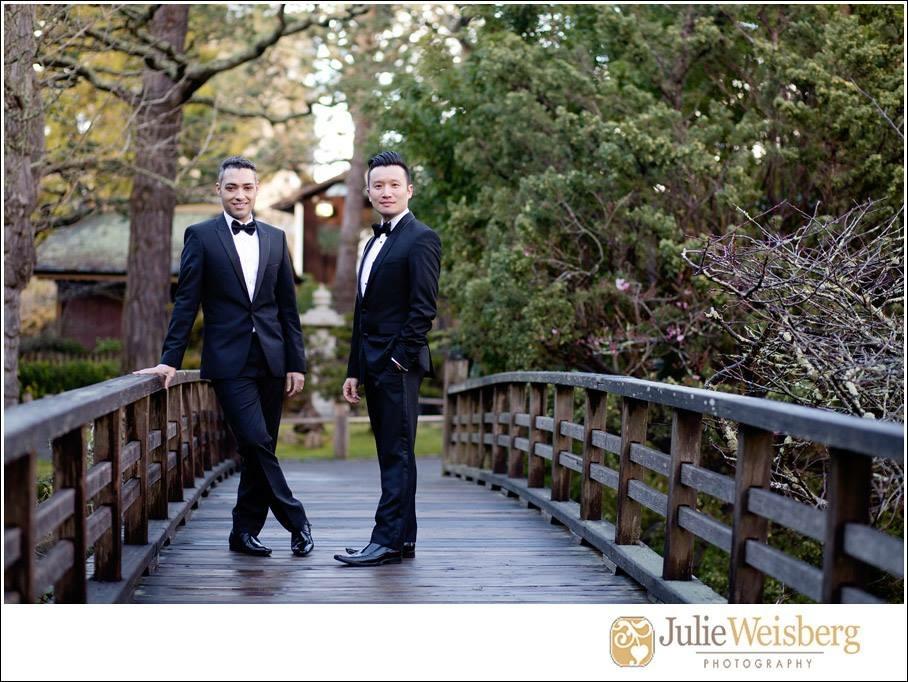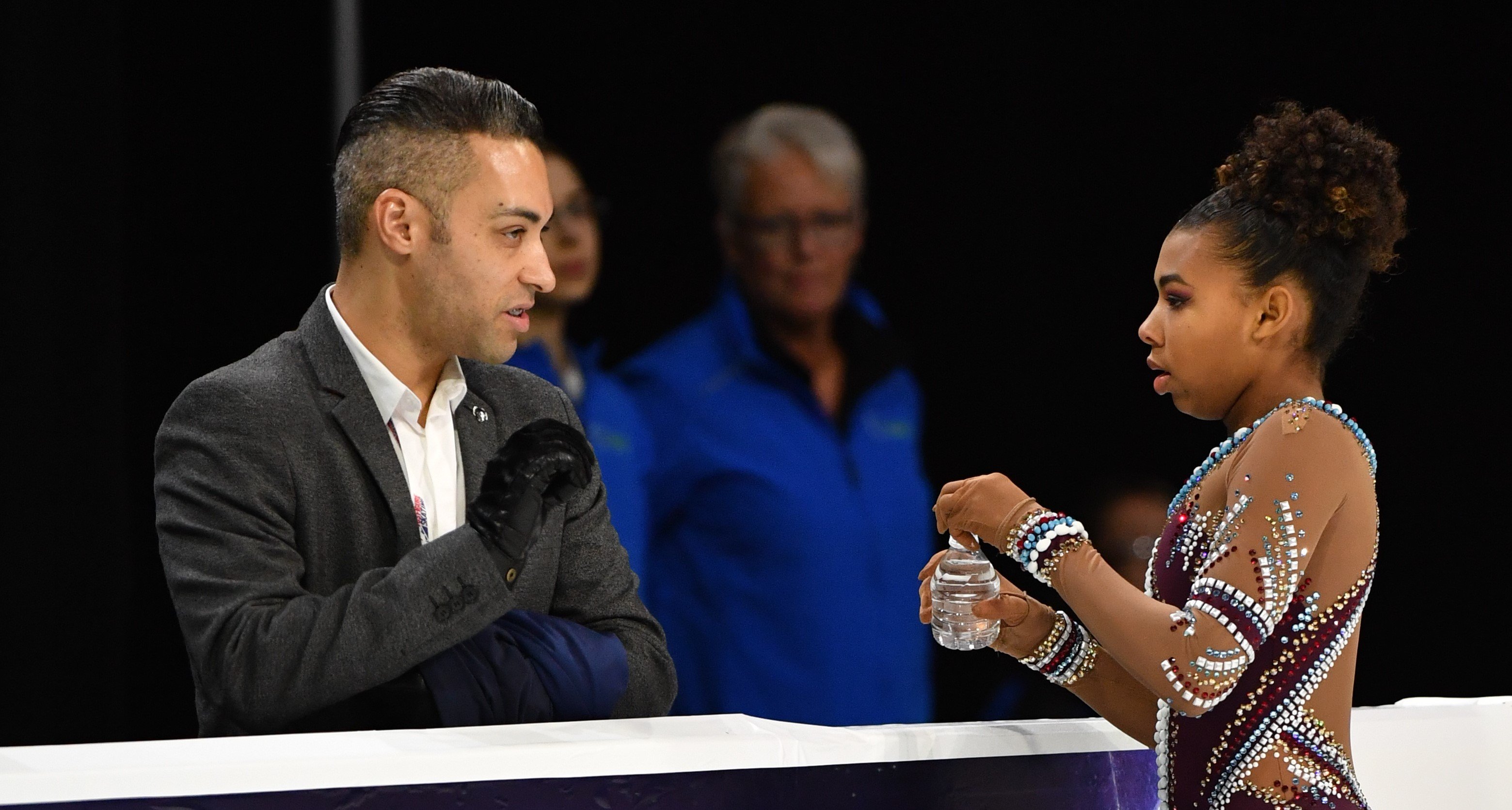Above: Delmore coaches standout Starr Andrews during the warm-up at 2019 Skate America®.
By Lois Elfman
Now coaching for two decades, 1998 World Junior champion, U.S. pewter medalist in novice and junior and 10-time senior competitor Derrick Delmore is inspired by skaters.
“It’s rewarding for me to see their growth — from my young skaters just starting out to my adult skaters,” Delmore, 42, said. “For the younger skaters, it’s seeing their growth not only on the ice but off the ice as well. I think of my job as being more than just a skating coach. I’m also helping to shape the skaters into young adults, and hopefully I’m helping to instill important life lessons.”
At this point in his career, Delmore, who has coached in the Los Angeles area for almost 14 years, embraces the idea of always believing. He eschews preconceived notions of what people are going to be able to do.

“Time after time … I’ve been really surprised about what some of my pupils have been able to accomplish,” he said. “It’s this constant reminder for me to never underestimate the abilities of anyone.
“I want my athletes to always believe in what they’re doing and know their potential is limitless.”
For Delmore, his World Junior title is a reminder of the power of positive thinking. He’ll never forget standing on top of the podium and hearing the national anthem. It felt validating because people doubted that he’d be able to go to college full-time and skate competitively. At the time, he was attending Stanford, a world-renowned, highly competitive university.
Highlights of his competitive days include making friends with people from all over the country and traveling to international competitions. He got to see places in the world he’d never otherwise see and do it with people who became lifelong friends.
He believes skaters should be training and competing for themselves, which he realized toward the end of his competitive days. Although his highest finish in the senior division at the U.S. Championships was fifth in 1998, he felt at his best when he tapped into his true desire.
“I think I was at my best at the very end of my skating career, because I finally was doing it for myself,” Delmore said. “I didn’t feel like I was out there every day trying to skate for the approval of judges or my coach or my mom. I truly was out there because I wanted to do it for myself, and that’s when I felt I was at my best. That’s something I try to instill in my students.
Delmore’s coaching philosophy also includes never giving up. He cites Adam Rippon, whom he worked with leading up to the 2018 Olympic Winter Games, as an example of this.
“He was going to do everything he could to make that Olympic dream come true,” said Delmore, who was part of Rippon’s coaching team in PyeongChang. “Look where he is today. It’s so amazing and impressive.”
In the spring, Delmore, a member of the U.S. Figure Skating Diversity, Equity and Inclusion Task Force, was called upon to choreograph a program in tribute to the late Mabel Fairbanks that would debut at Figure Skating in Harlem’s (FSH) virtual gala. He envisioned a trio for his longtime student and U.S. competitor Starr Andrews, pairs skater Vanessa James and French ladies champion Maé-Bérénice Méité, but when Méité was injured and James was unable to leave Canada (she recently teamed with Eric Radford), he adapted his vision.
“There were definitely a lot of challenges, but we made it work,” said Delmore, who had hoped the three skaters would be filmed in New York as an ensemble. Andrews was filmed in New York by Jordan Cowan of On Ice Perspectives and James was filmed in Canada, with Cowan doing a clever edit to meld their performances.
“I wanted to create a program that highlighted their strengths as young Black women who are at the forefront of the sport,” said Delmore, who performed with FSH in 2003. “They are representative of a population of skaters that you don’t normally see at the top of the sport. They are meant to be where they are and nobody is going to hold them back.”
He went through several pieces of music, ultimately choosing the song “Listen” from the film Dreamgirls, which is sung by Beyoncé, finding the song’s lyrics reflective of the journey of the three skaters. The text mentions not being held back, which was certainly Fairbanks’ story.
Delmore began coaching after graduating from Stanford University in 2000. When he returned to the East Coast and decided to continue skating, he knew he also had to earn a living. His then-coach, Shirley Hughes, had him work with some of her skaters, for which he remains grateful.
“I fell in love with it from the beginning,” Delmore said. “When I decided to hang up my competitive skates, I turned around and I was a full-time coach. I realized it was something I truly connected with and loved.”

He coaches at The Rinks – Lakewood Ice in Lakewood, California. When he first moved to Southern California, he worked at several rinks — sometimes coaching at four rinks in one week — but he settled into Lakewood as his main rink several years ago. He works alongside Peter Kongkasem, Ivan Dinev and Angela Nikodinov as well as former rhythmic gymnast Anastasiya Sharenkova. Additional coaches joining their team include Naomi Nari Nam Poor, Amy Evidente and Jonathan Cassar.
“We all bring different stuff to the table that I think is comprehensive for our program and for all the skaters,” said Delmore, who has worked with Andrews since she was at the juvenile level.
Delmore’s personal life is also thriving. He and his husband of four years, Dr. Kenneth Leong, an internist trained in osteopathic medicine, met when Leong was doing a fellowship in Southern California. After the fellowship, Leong accepted a position in his native San Francisco, and they deftly balance a commuter marriage. The long-term plan is to live in the same city, but as they build their careers, this works well.
“During the week, we’re both so busy with work and have long hours,” Delmore said. “The times that we have been together on a workday, at the end of the day we’re exhausted and we both bring so much work home. … We don’t really have time for each other in the evenings.
“The weekends really are our time to spend together. Either I fly up or he flies down. For both of us, we would love for life to slow down a little bit, but at our age and the points we are in our careers right now, we’re making the most of our opportunities. This is the time for us to push hard in our careers. We understand that.”
This past year had its challenges. Delmore recalled thinking that COVID-19 would keep skaters off the ice for a few weeks, but that turned into months. He got creative with Zoom off-ice classes and also used the time to choose and edit music.
When the rinks finally reopened, finding ice time was not easy, so the skaters went from rink to rink. Competition turned into virtual events, but Delmore and his colleagues did their best to keep everything positive. Skate America® and the 2021 U.S. Championships provided fresh momentum.
“At this point, everyone is excited for the potential of in-person events,” he said.


